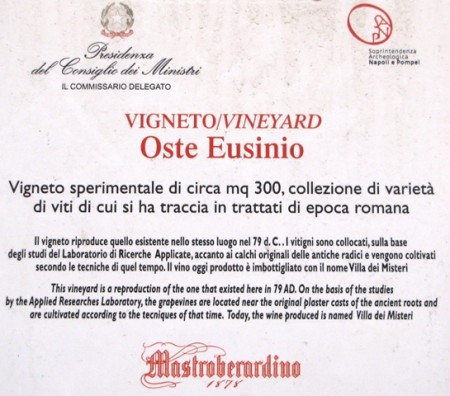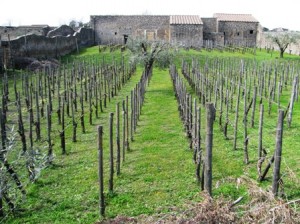- Blogging machine Tom Barnett worried about effect of climate change on his favourite tipple.
- BGCI shell out for cool animation on social role of botanic gardens, and it’s totally worth it.
- As also, but differently, are IUCN’s videos on forest restoration.
- All the world’s forests, online, any day now, to monitor the opposite of their restoration.
- Europe tries to stimulate innovation in plant breeding. By holding a meeting. Ah, but there’s a hashtag.
- Development economists illustrate interesting point about gender and yam cultivation with photo of sweet potatoes.
- The organic attitude to inorganic nitrogen.
- Late Pleistocene hunter-gatherers ate fish. Well I never.
- Reviews of couple books on agricultural origins.
- Need bioinformatics training? Who doesn’t.
- ICRAF reviews efforts to monitor sustainable intensification. Somewhere. I can’t for the life of me find the actual document.
The grapevines of Pompeii

According to Mastroberardino, wine played a central role in the lives of the Vesuvian people. Archaeological excavations, botanical studies, and the discovery of casts of vine roots and their support stakes have confirmed that vines were grown within ancient Pompeii’s city walls, in the gardens and orchards which beautified villas, and especially in the quarters located on the outskirts of the city, near the amphitheatre.

Brainfood: Moroccan almonds, MAS in potato, Mexican maize market, History of agronomy, Malian querns, Hani terraces, Conservation modelling, Wild Cucumis, Pathogens and CC
- Moroccan almond is a distinct gene pool as revealed by SSR. Ok, now what?
- Molecular markers for late blight resistance breeding of potato: an update. Ok, now what?
- Reconstructing the Maize Market in Rural Mexico. Not so free after all.
- Why agronomy in the developing world has become contentious. Neoliberalism, participation and environmentalism. The answer? Political agronomy.
- Millet and sauce: The uses and functions of querns among the Minyanka (Mali). Form depends on more than just function.
- Landscape pattern and sustainability of a 1300-year-old agricultural landscape in subtropical mountain areas, Southwestern China. If it ain’t broke, why fix it?
- Mathematical optimization ideas for biodiversity conservation. Fancy math works sometimes but not always. Wonder if it would work on the Hani terraces above. Or on Mexican maize for that matter.
- Mitochondrial genome is paternally inherited in Cucumis allotetraploid (C. × hytivus) derived by interspecific hybridization. Not the chlororoplast genome though. Weird. But now what?
- Migrate or evolve: options for plant pathogens under climate change. Or, indeed, both. But we need better models, and a better handle on what human interventions can do. Interestingly, pathogen diversity may well increase in some places.
Nibbles: Botanic gardens & forest foods, Militants against IRRI, Modern ancient farm, Conservation software, Urban mowing sheep, Agro-ecology, Beans, Value of genebanks, Seed savers, Video
- Botanic gardens get into the restoration business. So that people can again eat nutritious forest foods. No, really, even the BBC says so.
- Militant Filipino NGOs target IRRI. Not for the first time. And probably not the last.
- Anyone planning to go to the Beltain at Butser Ancient Farm? Only a month to go…
- You are probably already using at least one of these.
- Paris looking to go all sheepish.
- I don’t know about you, but I immediately turn off when somebody says that X is the only answer to Y. Even when the X is agro-ecology.
- Même s’ils le disent en français.
- Chinese “board beans” are actually lablab shock.
- You going to spend an evening at The Genome Analysis Centre discussing the value of genebanks? Tell us about it!
- Dutch seed savers looking to get organized.
- New York times goes overboard for Digital Green participatory video.
Nibbles: Property rights, Dryland crops, New tomato, CGIAR genebanks, Quinoa in US, Wasps and figs, Ancient New World agriculture, Allium CWR, SADC seed law, ESA, Coconut pollination
- Why tenure matters. And why it doesn’t.
- Book on alternative crops for dry areas. Not that alternative, settle down. And anyway, how do they do in mixtures?
- And the award for Best New Variety of the Year goes to…
- CGIAR Consortium hires private sector biotech expert to oversee genebanks et al.
- US set to grow more quinoa. Shame on you, taking the bread out of the mouths of Andean peasants!
- Save our figs!
- Malanga and cassava important on Mayan menu. And maize maybe not so much on Pueblan one as thought.
- New onion wild relative spotted in Central Asia.
- GRAIN objects to new one-size-fits-all SADC seed law.
- Ecological Society of America discovers agriculture.
- Indian institute trains first female coconut pollinators.